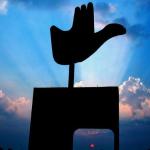Some early modern thinkers saw the American Indians as exemplars of natural man, but JQ Adams believed the opposite: “Shall [Indians] doom an immense region of the globe to perpetual desolation, and to hear the howlings of the tiger and the wolf, silence forever the voice of human gladness? Shall the fields and the vallies which a beneficent God has framed to teem with the life of innumerable multitudes, be condemned to everlasting barrenness? Shall the mighty rivers poured out... Read more




















